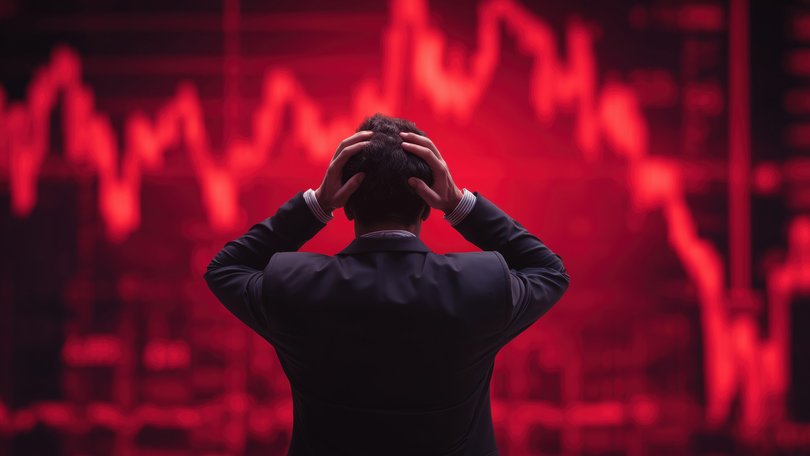BRUCE BRAMMALL: Why it pays to keep a cool head during market meltdowns
DEBTMAN: There are those who think they’ll play the smart game while watching market turmoil and sell everything down to cash. But can you buy back in when the panic stops?

I’ve lost track of how many people I’ve met who’ve made disastrous decisions during market meltdowns.
I usually meet them years later. By then, the destruction of having made “Rookie Error #1” has compounded. Badly. It’s cost them thousands, often tens of thousands of dollars.
(Sadly, I’ve even seen it where it wasn’t the client’s error, but their adviser’s. I’ll come back to this.)
Sign up to The Nightly's newsletters.
Get the first look at the digital newspaper, curated daily stories and breaking headlines delivered to your inbox.
By continuing you agree to our Terms and Privacy Policy.The act of panic that kicked off the literal disaster was then followed by complete freeze, denial and inability to act to recover.
What am I talking about? Those who think they’ll play the smart game while watching market turmoil — like we’ve experienced in recent weeks — panic to protect their investments (usually their super) and sell everything down to cash.
They think they’ll shrewdly sit out the volatility. And they’ll buy back in, when the madness has ended and have saved themselves from the horrendous falls.
They acted to end pain. Thought they were being smart. They aren’t experts, but it can’t be that hard. I’ll just buy back in when the panic stops.
Then . . . they . . . just . . . can’t . . .
They don’t make the call, hit the button, get themselves invested by buying back in.
Markets then rebound, back above what they sold at. They expect it to fall again, giving them another opportunity to buy in at a lower price than they liquidated for initially.
But markets keep on doing the whole recovery thing. They put the decision off, thinking they’ll just wait until the “next” correction and will be able to limit the damage.
And then they sit in cash. For years.
Panic index
Sadly, this strategy generally works very, very poorly. Particularly since 2007, when average interest rates have been historically low and their cash has earned three parts of five-eighths of very little.
Recent global volatility has been largely caused by concern about overvaluation of AI companies, doubts about the US Fed cutting rates and persistent inflation.
What concerns global markets generally flows over locally, but Australian markets have also been challenged by the Reserve Bank’s outlook on interest rates and overvaluation concerns in the banking sector.
The global fear index (VIX) started ticking up late last month. And it has continued to trend upwards since.
Take a chill pill
When the VIX starts spiking, it generally means markets are tumbling. And generally moving out of the business pages and into the front of the paper, or into the first few items of news bulletins.
And when that happens, mums and dads start getting concerned: “Should I cash out? Reduce exposure to AI markets, stock markets?”
Financial professionals and fund managers, who are watching screens as a full-time job, only get their calls right about 50 per cent of the time. What hope do you have?
Long bad call
A new client I first met back in 2019 showed me how even financial advisers can get these calls badly wrong. And also compound them.
The client’s super was sitting about 80 per cent in cash. Further investigation showed that no new money had been invested since March 2009.
Timeline reminder: the market crash that surrounded the GFC started in November 2007 and finally bottomed out in early March 2009. From there it began its recovery.
The platform provided me with an email where the previous adviser had instructed, in mid-March 2009, no further investment. All new money to sit in cash.
There were several reviews between the adviser and the client in the next few years, as markets were recovering. The decision was never communicated to the client (let alone authorised) and nothing was done. Cash continued to grow.
We ran the numbers and estimated this had cost his super about $120,000. Complaint lodged with the Australian Financial Complaints Authority.
AFCA agreed and awarded him compensation.
Sit tight
Markets always recover. Eventually. You just don’t know when.
While the drivers (fear and panic) to cash up are easy to understand, what’s going to drive you to push the button to reinvest? Recoveries don’t tend to be anywhere but the business pages.
Unless you have a solid plan on how you will make the decision to reinvest, you are almost certainly better off fighting your urges to cash out during turmoil.
Acting in these situations is often dangerous. Doing nothing will often be more rewarding.
Bruce Brammall is the author of Mortgages Made Easy and is both a financial adviser and mortgage broker. E: bruce@brucebrammallfinancial.com.au.
